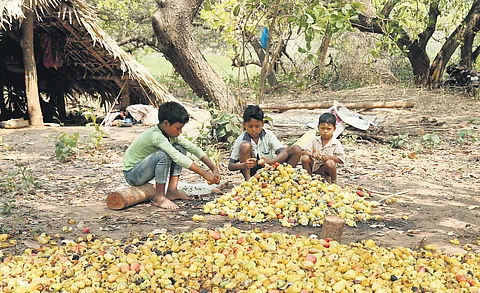

VISAKHAPATNAM: Amidst enduring struggles for basic infrastructure, tribal communities face yet another challenge as they grapple with the hard task of travelling over 10 kilometres to reach their polling stations during elections.
The oversight and non-selection of suitable polling stations by officials have left these tribal villagers disheartened.
As many as 532 voters from 11 out of 15 villages in Cheemalapadu Panchayat have been urging authorities to establish a polling booth at MPPC School in Jogumpet so that they do not have to walk long distances to cast their votes.
Recently, TNIE visited a few tribal villages, including Ajaypuram, Rayapadu, and Kadagedda, in the Cheemalapadu panchayat of Ravikamatham mandal in Anakapalle district.
Ajaypuram, inhabited by the ST Konda Dora tribes, has 25 families with nearly 200 residents and 60 eligible voters.

However, villagers must endure a 12-kilometre journey to the Cheemalapadu polling station to cast their vote, despite the presence of the MPPC elementary school in Jogampeta just one km away from their village. The school has the required amenities, making it a suitable polling booth.
Reflecting on the challenges faced by his village, Pangi Vijay Kumar lamented the lack of adequate road connectivity.
“Our main problem is road connectivity. While there is good connectivity until Jogampeta school, the pathway to our village remains undeveloped. This hampers access to essential services like ambulances,” he explained.
Kumar advocated for the establishment of a polling booth at Jogampeta school, emphasising the potential benefits for not only his village, but also neighbouring villages.

Furthermore, the promises made under the Jal Jeevan Mission have yet to materialise, leaving villagers disappointed. Despite initial efforts, such as the installation of a bore and the construction of a water tank nine months ago, progress has stalled.
These Particularly Vulnerable Tribal Groups (PVTGs), reliant on cashew plantations for their livelihood, face additional challenges this year due to diminished harvests, exacerbating their economic hardship.
Like Ajaypuram, Rayapdu village grapples with a multitude of challenges such as the absence of proper roads, scarcity of drinking water, the non-issuance of Aadhaar cards for some villagers and frustrating delays in distribution of essential government provisions.

“Surveys have been done as many as five times yet, and only two of the 15 houses have received D-form pattas to our lands,” one resident lamented.
Another villager highlighted the inconvenience of the irregular distribution of monthly groceries, stating, “The ration we get from the government is not supplied in a single go. We are required to walk for several kilometres and collect our groceries in two to three tranches.”
The villagers of Rayapadu, too, will have to traverse 13 kilometres to reach the polling booth. “Autos do not service our village due to the absence of proper motorable roads,” a villager noted.
Expressing their disillusionment, villagers emphasised the apparent disconnect between elected representatives and their constituents. Tribal leader K Govind Rao underscored the urgent need for higher authorities to actively monitor and assess the implementation of sanctioned projects in tribal areas.
“Higher authorities must prioritise regular follow-up, and survey of sanctioned projects in tribal areas. Despite projects being sanctioned at the higher levels, their implementation often falls short of expectations. Ensuring responsibility and accountability is crucial in bridging this gap between intention and action,” he opined.